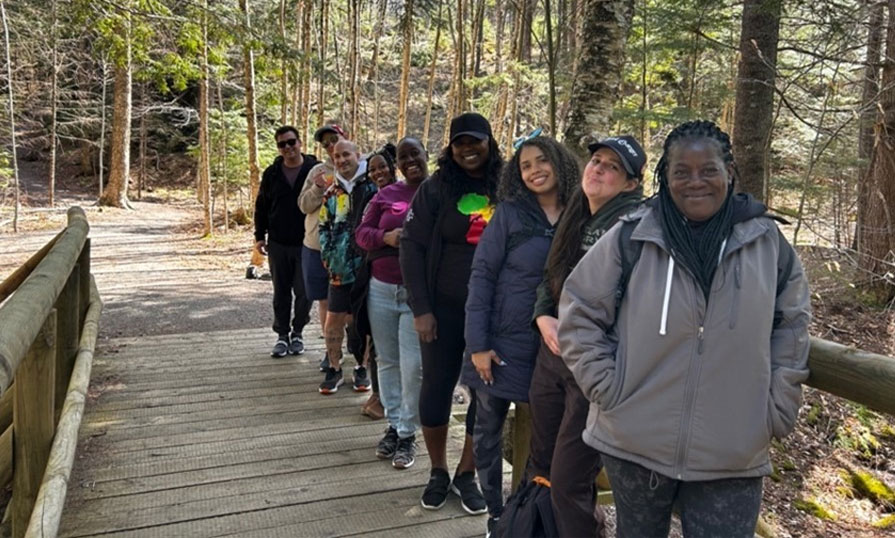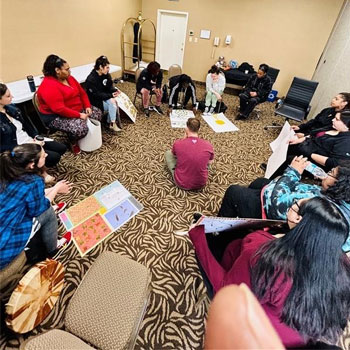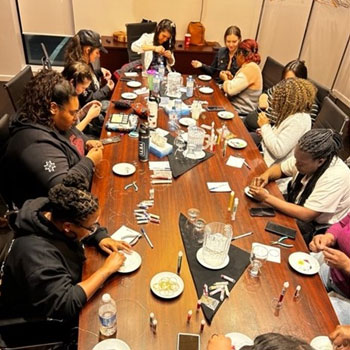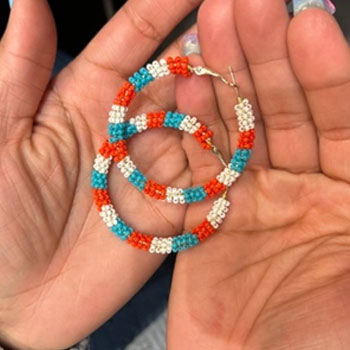Breaking systemic division: Africentric and Mi’kmaw ECE cohorts gather for a weekend of cultural exchanges

NSCC’s Africentric and Mi’kmaw Early Childhood Education (ECE) cohorts gathered in Truro for a weekend of connection – a weekend aimed at rekindling a deeply rooted relationship between two distinct communities.
The weekend held space for sharing and connection, while it also challenged students in self-reflection as community members.
The gathering began by welcoming students into a circle, a traditional tool used by both communities as a way of connecting. It was an opportunity to see who was gathering – four Africentric students and six L’nu students, including their two student supports and two faculty. Students were encouraged to introduce themselves and their immediate connection to the place, an intersection of certainty.

“I wasn’t sure what to expect. I saw the immediate vulnerability shared in place. I couldn’t have asked for anything better.” - ECE student
Students explored the importance of self-reflection and how journaling can support self-awareness. Through directed inquiry, faculty probed students with valuable questions to reflect at a deeper level – inquiry which continued into self-solitude as the group retired from their first evening.
“My biggest reflection was owning my desires, needs and wants, it was a good question that made me think deeply about myself.” - ECE student
Rising with the sun, students began the first full day exploring their understanding of relations and family. In recognizing who walks with them, or in the Mi’kmaw language - Msit No’kmaq - all my relations. In presentation, students developed a visual representation of their understanding using art-based mediums of choice.
A gentle walk through Victoria Park positioned the group in exploring the benefits of nurturing their mental, emotional and spiritual self. And, in turn, how conscious recognition of our whole selves can be used in our learning environment. The weekend held space for sharing and connection, while it also challenged students in self-reflection as community members.

The Mi’kmaq Honour Song was sung for the four winds, giving thanks for the gathering.
As evening rolled in, the night was met with beadwork. Beadwork and the art of beading are fabricated through both communities. As a way of ceremony, connecting, sharing and exploring, students indulged in beadwork.
With steady hands, students weaved a series of colored beads around metal earring hoops. The beauty of beading is founded in the unique creations of each student’s piece- it’s an opportunity to express themselves in a different way - a contemporary way.
“Beading is so meditative for me. It’s like adult colouring.” - ECE student
Beading extended into the wee hours of the morning and gave way to a late breakfast for many. Certainly, a great way to rise the last morning together.
In the final circle, students shared their understanding of family and relations. They had the opportunity to share more about who they are and how they are connected. It also gave room to recognize the colonial impacts and displacement of people.

In celebration, students recognized the forever relationship that has been prominent between the two communities for over 400 years - rekindled once more.
“Our land-based elements have also been very important to me because we learn so much about the land itself, the geography, history, legends and medicines and the cultural pieces. Our gatherings allow us to put them all together, in one place. “ - ECE student
As a final activity, students took ‘speed dating’ to a whole new level. In pairs, students engaged in deeper, more vulnerable questions. Each student had a one-on-one with instructors to explore goals both in short and long term, setting a plan for success.
With only a few short months until graduation. Students departed the gathering with a common goal in sight – graduation.
“I am truly blessed and humbled to know each one of these wonderful people.” - ECE student

